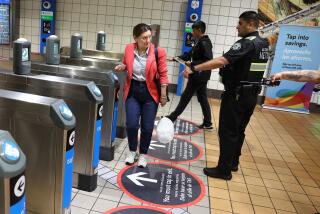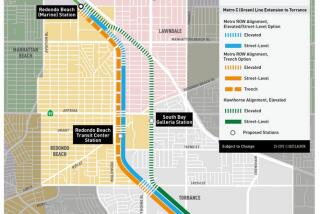Bus Riders Fear Increases in Fares
Herminia Rodriguez stood outside the headquarters of the Southern California Rapid Transit District one day this week clutching her newly purchased bus pass and a sheaf of medical disability papers that underscore her dependence on public transit.
Rodriguez, who subsists largely on her monthly $228 disability check, had just learned that her costs for riding the bus may soon double. And the 59-year-old woman was worried as she spoke of her reliance on the bus for everything from hospital visits for treatment of glaucoma and arthritis to shopping for food.
âItâs just terrible,â Rodriguez said of the planned fare changes. âI donât know whatâs going to happen. Iâve never owned a car and I donât have a lot of money. I donât know what Iâll do.â
Sixteen-year-old Milagros Martinez was equally perplexed. At a crowded stop outside Manual Arts High School in South-Central Los Angeles, she pondered what the proposed jump--to $18 from $4--in her bus pass would mean. âItâs not fair,â she said. âSome of the students here donât even have enough money for lunch.â
And as he rode on the 443 Express along the Harbor Freeway, USC Prof. Robin Ranger noted that the long-distance bus line he has been riding for nearly four years is once again on the RTDâs âendangered speciesâ list, targeted for elimination.
âWhenever they post those proposed changes,â the Redondo Beach commuter said with a laugh, âyou know theyâre after us again.â
It is a time of anger, frustration and little humor for bus riders as the RTD prepares for Saturdayâs daylong public hearing into its planned shake-up in bus fares and service reductions. The sweeping changes will have an across-the-board effect on the 1.6 million riders who board the districtâs buses daily. And many of them, as reflected in dozens of interviews, are not happy about it.
District officials say the increased fares are needed to offset the pending loss of from $38 million to $45 million in subsidy funds generated by a voter initiative that have helped keep fares at the 50-cent level since 1982.
The district receives $133 million for bus fares from the half-cent countywide sales tax, but RTD officials say that will be reduced to about $95 million July 1 when rail transit projects are supposed to receive a larger share of the funds.
Under the districtâs plan, the base fare would rise to 75 cents from 50 cents and the basic monthly bus pass would increase to $34 from $20. Discount rates for students and the elderly and handicapped also would be eliminated or modified.
In addition, the costs of express service would rise to $12 from $7 a zone. And 10-cent transfers, which now allow passengers to change buses as many times as needed to complete their trip, would be limited to only one use. Service cuts would mean fewer buses on some lines, pared-down weekend service and the cancellation of some nightly runs and rush-hour express buses.
Among the express lines that would be cut is the 443 Line, which runs from the Union Station downtown to the Palos Verdes Peninsula.
Commuters on that route who pay $42 for a bus pass would pay more than $70 under the changes, and they would also have to make transfers instead of getting direct service. Although many of the riders heading downtown on the 443 are fairly affluent professionals, some of the commuters from Los Angeles are domestic workers on a reverse trek to expensive homes on the Palos Verdes Peninsula.
âIâm concerned about the domestics,â said RTD bus driver Josie Petry. âThe majority of them donât own a car, so itâs a serious situation for them. Theyâll end up having to pay more money in fares and then end up having to transfer more often.â
More to Read
Sign up for Essential California
The most important California stories and recommendations in your inbox every morning.
You may occasionally receive promotional content from the Los Angeles Times.










